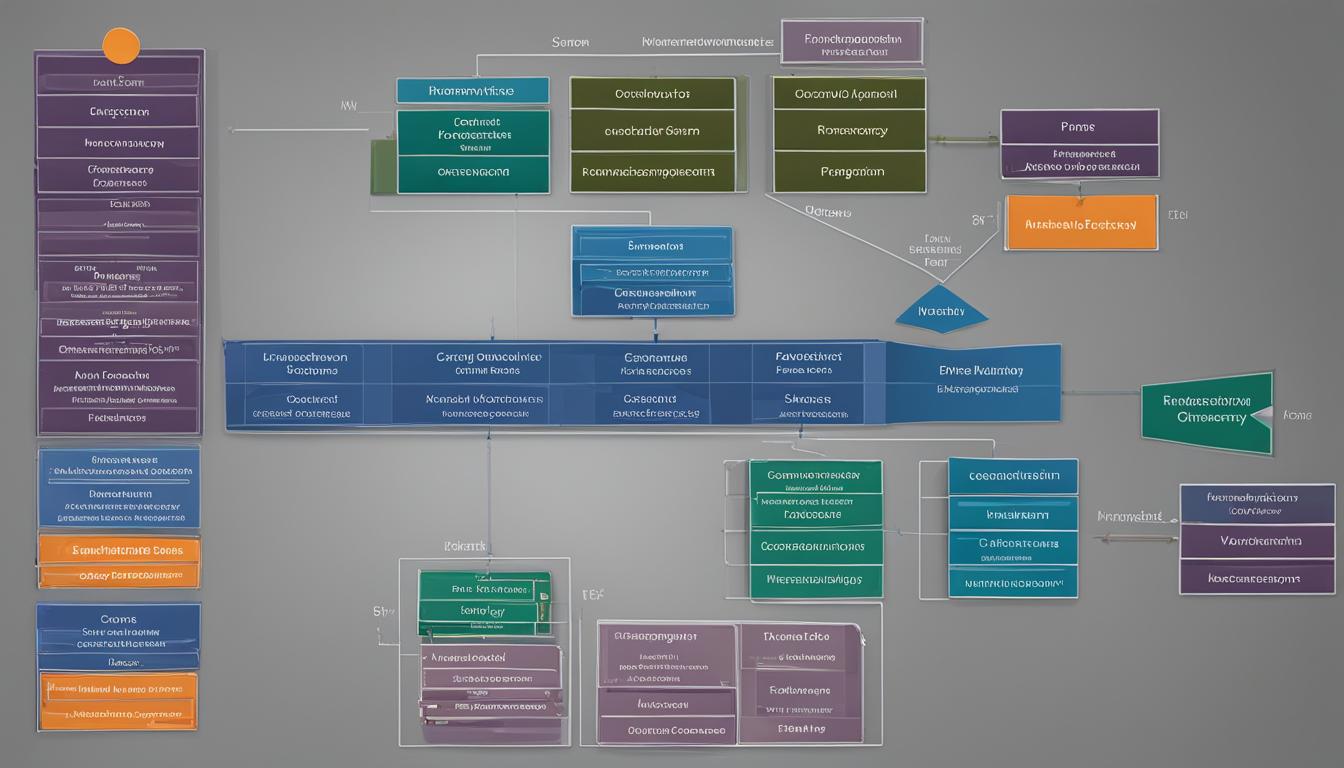What is a server? Pros, cons and comparisons
Did you know that a server can be the backbone of your business’s digital infrastructure? It allows users within your organization to access documents, software applications, and other resources through a centralized network hub. With its ability to store and manage company files and data, a server plays a crucial role in enhancing collaboration and efficiency.
There are various types of servers available, each with its own set of advantages and disadvantages. It’s essential to understand the pros and cons to determine if a server is the right solution for your business needs. From convenience and reliability to cost and maintenance considerations, there are several factors to consider when weighing the benefits and drawbacks of having a server.
Key Takeaways:
- A server is a computer system that provides a centralized hub for users within a business to access resources and collaborate effectively.
- Having a server offers convenience, reliability, and enables network sharing of devices and key business applications.
- Server drawbacks include the cost of hardware, maintenance, space constraints, and the need for ongoing IT support.
- Cloud-based server options, such as Office 365 and dedicated server hosting, provide flexibility and scalability without the need for physical infrastructure.
- Choosing between a cloud server and a physical server depends on factors like performance, security, cost, deployment, and maintenance.
Pros of Having a Server
When it comes to the benefits of having a server, the advantages are numerous. Let me walk you through some of the key advantages that businesses can gain:
- Convenience: With a server in place, you have a central hub that keeps your company files, application data, and resources all in one place. This means that every team member can easily access what they need, when they need it, without any hassle or delays.
- Reliability: A server operates 24/7, providing uninterrupted service and ensuring that your files and resources are always available. Even in the rare event of a hard drive or server crash, a professionally configured server maintains consistent backup and recovery, keeping your business operations up and running smoothly.
- Network Sharing: With a server, you can enable network sharing of devices such as printers or fax machines, making it easier for your team to collaborate and streamline their workflows. By sharing key business applications, everyone can access the tools they need to work efficiently and effectively.
- Security: Protecting your sensitive data and managing user access is crucial for any business. A server allows you to implement robust security measures, ensuring that only authorized personnel can access confidential information. This provides peace of mind and safeguards your company’s valuable assets.
Having a server not only brings convenience, reliability, and enhanced security to your business operations but also promotes efficient collaboration and streamlined workflows. To better understand the benefits of having a server, let’s take a closer look at a real-world example:
Example: Streamlining Collaboration with a Server
Imagine a marketing team working on a high-priority project with tight deadlines. With a server, all team members can access and edit project files in real-time, eliminating the need for time-consuming file transfers or version control issues. They can also share printers, making it easier to print marketing materials and collaborate seamlessly. The server’s continuous backup and reliable infrastructure ensure that all files are secure, even in challenging situations such as unexpected hardware failures.
By leveraging the convenience, reliability, network sharing, and security features of a server, businesses can optimize their operations and empower their teams to work more efficiently. The advantages of having a server are clear, and many businesses find that the investment pays off in improved productivity and long-term growth.
Cons of Having a Server
While there are many advantages to having a server for your business, it’s important to consider the potential drawbacks as well. Here are some of the key disadvantages to keep in mind:
- Cost: Purchasing the necessary server hardware, software, and components can be a significant investment. Additionally, the installation, setup, and ongoing maintenance require technical expertise, which may incur additional costs. It’s essential to carefully evaluate the financial implications of having a server.
- Maintenance: Servers require regular maintenance and updates to ensure optimal performance. This maintenance includes tasks such as installing security patches, monitoring system health, and troubleshooting any issues that arise. Ongoing IT support is often necessary to handle these maintenance requirements effectively.
- Space Constraints: Servers typically take up physical space due to their size and the need for proper cooling and ventilation. If your company has limited space available, accommodating a server may present challenges. It’s crucial to consider whether you have the physical resources to house a server in your workspace.
- IT Support: Effectively managing and maintaining a server requires technical knowledge and expertise. If your business lacks internal IT resources, you may need to rely on external IT support, which can add to the overall cost of having a server.
Considering these disadvantages, it’s important to weigh them against the benefits to determine if having a server is the right choice for your business. Now let’s take a look at some cloud-based server options that can provide an alternative solution.

| Factors | On-Premises Server | Cloud-Based Server |
|---|---|---|
| Cost | Higher upfront cost for hardware and maintenance. | Pay-as-you-go pricing, potential for cost savings. |
| Maintenance | Requires ongoing maintenance and updates. | Managed by the service provider. |
| Space Constraints | Requires physical space and temperature control. | No physical space requirements. |
| IT Support | May require external IT support. | Vendor provides technical support. |
Cloud-Based Server Options
In addition to on-premises servers, businesses also have the option to leverage cloud-based solutions for their server needs. Cloud computing has transformed the way organizations access and manage their resources, offering a range of benefits and flexibility. Two popular cloud-based options include Office 365 and dedicated server hosting.
Office 365: Office 365 is a powerful cloud-based solution that provides businesses with a suite of productivity tools and services. It offers features such as file storage and sharing, printer management, and user identity management. With Office 365, you can securely store and access your files from anywhere, collaborate with team members in real-time, and streamline your workflow.
Dedicated Server Hosting: Another cloud-based option is dedicated server hosting, where you rent the use of an off-site server from a provider. This solution offers many of the benefits of an on-premises server without the need for physical space or maintenance. Dedicated server hosting provides a reliable and scalable solution for businesses that require robust computing power and data storage.
When considering cloud-based server options, it’s important to evaluate your internet bandwidth requirements. Cloud solutions rely on a stable and high-speed internet connection to ensure smooth performance and accessibility. Consulting with your internet service provider can help you determine the appropriate bandwidth needed to support your cloud-based server solution.

| Cloud-Based Server Options | Key Features |
|---|---|
| Office 365 | File storage and sharing Printer management User identity management |
| Dedicated Server Hosting | Off-site server rental Scalable computing power Reliable data storage |
Choosing Between Cloud and Physical Servers
When it comes to deciding between a cloud server and a physical server, there are several crucial factors to consider. Performance is a key consideration, with cloud servers relying on a stable internet connection, while physical servers depend on their proximity to users. In terms of security, cloud servers offer shared security measures and compliance with industry standards. On the other hand, physical servers provide more control over data security.
Cost is another important factor to weigh. Cloud servers typically have usage-based pricing models, allowing businesses to pay for the resources they actually use. This scalability offers flexibility and cost-saving potential. Conversely, physical servers require an upfront capital investment, but may be more cost-effective for long-term use.
Deployment and maintenance are also significant aspects to evaluate. Cloud servers are known for their ease of deployment, enabling businesses to get up and running quickly. Additionally, they require less maintenance compared to physical servers, as the hosting provider takes care of infrastructure updates and system maintenance. Physical servers, on the other hand, require manual installation, setup, and ongoing maintenance by the business or their IT team.
To make an informed decision between cloud and physical servers, it is crucial to assess how these factors align with your specific business requirements and budget. Consider the importance of performance, security, cost, deployment ease, and maintenance needs, as each option offers its own unique advantages and considerations. By carefully evaluating these factors, you can choose the server solution that best suits your business goals and resources.
FAQ
What is a server?
What are the advantages of having a server?
What are the disadvantages of having a server?
Are there alternatives to on-premises servers?
How do I choose between a cloud server and a physical server?
- Shop for Server & Workstation Systems & more - February 25, 2025
- IP Geolocation API and IP Location Lookup Tools - February 24, 2025
- What is GoDaddy? Everything You Need to Know in 2024 - February 23, 2025





![What Is a Host [Types & Other Things You Need to Know] What Is a Host [Types & Other Things You Need to Know]](https://webdoclab.ca/wp-content/uploads/2024/08/What-Is-a-Host-Types-Other-Things-You-Need-to-Know.jpg)















Post Comment
You must be logged in to post a comment.